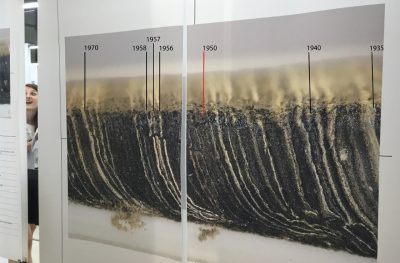Notice:
This event occurs in the past.
Science Café | The Anthropocene: Inside the Quest for the Human Epoch at Crawford Lake, Ontario
Wednesday, November 16, 2022 from 2:00 pm to 3:00 pm
- None event

The Anthropocene is a proposed geological epoch that encompasses the commencement of significant human impact on Earth’s geologic record and associated systems.
The Anthropocene Working Group (AWG) of the Subcommission on Quaternary Stratigraphy has approved establishment of a formal “Golden Spike” (Global Boundary Stratotype Section and Point; GSSP) type section. Following considerable debate, it was decided to establish the base of the new epoch in the mid-20th century.
This time period coincides with the start of the Great Acceleration, a post-WWII time period during which dramatic socioeconomic changes, as well the Atomic Age, have left and continue to leave a permanent signature in the geologic record. The AWG has identified 12 potential GSSP candidates; a leading candidate of which is Crawford Lake, within the Golden Horseshoe, at the western end of Lake Ontario.
The annually deposited and superbly preserved laminations that comprise the sedimentary record of the lake contain diverse proxies of industrialization, nuclear weapons testing and other environmental change that have been documented to characterize the beginning of the Anthropocene. The lake is protected within the Crawford Lake Conservation Area and is of additional cultural significance as the sedimentary record of the lake also preserves evidence of habitation history of indigenous villages that were on the lake edge from the late 13th to early 16th centuries. The AWG will reveal its choice of the Anthropocene GSSP on December 8th, 2022.
ABOUT THE PRESENTER

Professor Tim Patterson is an environmental scientist in the Dept. of Earth Sciences, at Carleton University. He obtained his undergraduate degree in geology at Dalhousie University, and his Ph.D. from the University of California, Los Angeles (UCLA).
In addition to research focused on having Crawford Lake established as the “Golden Spike” for the proposed Anthropocene Epoch he is working with indigenous groups in northern Alberta and Canada’s North to develop “Stories of the Land”, based on the integration of traditional knowledge and western science. He also collaborates with several first nations to understand, mitigate and remediate degradation to lakes within their territories. He has recently undertaken a major research initiative to develop new techniques to track the periodicity of tropical cyclones that have struck Atlantic Canada through the past 1000 years.
He is also collaborating with other researchers at Carleton to determine whether there are linkages between major storms stirring up nutrients from lakes in the region and the occurrence of potentially harmful cyanobacteria blooms. This information is critical for policy makers and planners as they determine the potential double threat of modeled increases in tropical cyclone strikes and cyanobacteria blooms associated with climate change.
For more information about this topic visit:
Entry on Crawford Lake on the Anthropocene Working Group Website:
Open source article in Nature on the search for the Anthropocene GSSP